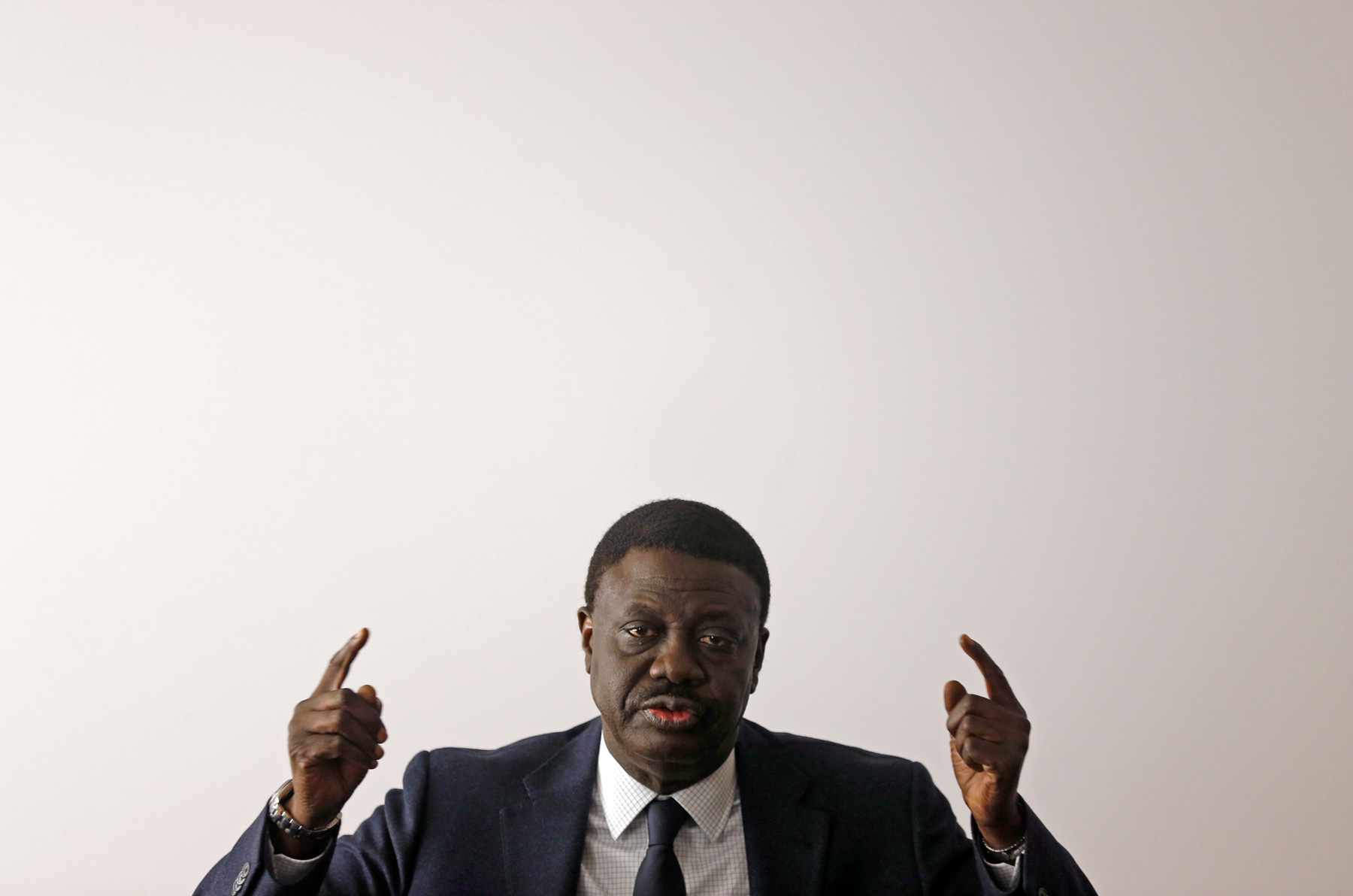Pape Diouf, a man of many footballing firsts
The first African to be president of a top European football club, Marseille’s Pape Diouf died at the age of 68 in his native Senegal, the West African country’s first Covid-19-related death.
Author:
23 April 2020

Pioneer and breaker of barriers Pape Diouf was, in an unfortunate turn of events, the first casualty of the global Covid-19 pandemic in Senegal. Aged 68 at the time of his death on 31 March, the former president of French giants Marseille leaves behind a rich legacy. Diouf inspired a generation of footballers and administrators to make their mark on world football.
Pape – son of Demba, a French civil servant, and Aminata Diouf – was born in Abeche, Chad. One of eight children, he had a modest childhood, growing up in Dakar and excelling academically and in sport while at school. But he struggled with discipline and was dismissed from the prestigious College Sacre Coeur because of his behaviour, prompting his father to send him to France to join the army.
Having been a soldier himself – Demba fought for France during World War II – his expectation was for his son to follow in his footsteps. Pape, however, chose a different path. Cut off from financial support, the youngster was forced to fend for himself. He did a number of odd jobs, working for the post office and unloading cargo from ships before eventually pursuing a career as a freelance journalist with La Marseillaise.
At the newspaper, he would rise through the ranks to become section chief for their coverage of Olympique Marseille, an exalted position, especially considering that he was the only black journalist on staff. He said he drew looks of astonishment at the time, telling the Jeune Afrique Sport magazine, “They often checked my press card. For some, a black man could not write well.”
It was around this time in the mid-1980s that his friendship with Cameroonian footballer Joseph Antoine Bell began, setting the wheels in motion for a change of career down the line. He turned to Bell for advice on his next career move when the Le Sport newspaper folded after a year.
Related article:
The goalkeeper suggested that Diouf become a football agent and, understanding the need for him to get a foot in the door, became the Senegalese’s first client.
Diouf’s stable grew. He represented French defender Basile Boli as well as the break-out 1990 Fifa World Cup star, Cameroon’s Francois Omam-Biyik. It was uncharted territory at the time for an African as the world of football agency was wholly populated by Europeans. Even though there were a number of high-profile African players plying their trade in Europe, their interests were not considered a major consideration. As such, they were largely underpaid in relation to their abilities.
Changing the landscape for Africans
Diouf began to change that, and quickly came to be known for his ability to speak candidly and drive a hard bargain where his clients were concerned. “We enjoyed negotiating with him, even though it was very, very hard,” admitted Lens president Gervais Martel, with whom Diouf negotiated for the transfer of Omam-Biyik.
In an industry where agents often have dodgy reputations, Diouf’s lack of avarice and zeal to put his clients’ welfare first set him apart. According to Bell, he was a man of “honesty and integrity” who remained unchanged despite his rising influence and increased earnings. “Money was important to him, but it was not an end in itself,” said Bell. “That made it easy for me to recommend him to others.”
The success of his players at Marseille saw Diouf’s client base swell, with the likes of Didier Drogba, Grégory Coupet, Marcel Desailly, William Gallas, Bernard Lama and Samir Nasri joining his stable. Diouf christened Ghana legend Abedi “Pele” Ayew “the black Maradona” following Marseille’s 1993 Uefa Champions League triumph, and would go on to manage his children André and Jordan.
With his increased profile came greater influence within the club and in 2004, he was appointed Marseille general manager in charge of sporting affairs. He would not be in the role for long, however. A year on, Diouf was named interim president, replacing Christophe Bouchet.

After fending off the objections of some on the board who were loyal to his predecessor and finding common ground with sporting director José Anigo, the Senegalese was named president on a permanent basis. He was the first and, to date, only black president of a top-tier European side.
Far from sparking vanity, it was a realisation that deeply concerned Diouf, as it made clear the “lack of diversity in the governing bodies of European football”.
Diouf was club president for four years and in that time, Marseille twice finished in second place in Ligue 1.
He was involved with the school of journalism in Marseille after leaving the club and ran unsuccessfully for election to the city council. But stepping back from the spotlight did not silence him. He was scathing on the subject of racism in France, decrying the fact that, “No matter how well I integrate, there will always be people for whom I will be the black man who landed from Africa.”
Inspiring the next generation
His life served to open many doors. As the black pioneer in such a powerful role at Marseille, he influenced others to aspire to senior administrative roles in major European leagues and challenge the status quo. Nigeria’s 1994 World Cup defender Michael Emenalo rose to become director of football at Chelsea in England and Burkinabè agent Yves Sawadogo, who ran for president of Burkina Faso’s football association, cites Diouf’s “deep understanding of human psychology” as a major lesson he gleaned from their acquaintance.
There was a sizeable groundswell in support of Diouf challenging for the plum job at the Senegalese football association, or even at the Confederation of African Football, and interviews with the French press frequently broached this line of questioning. With a background in journalism and his experience as an agent and club president, in addition to Diouf having built relationships with African federations during the course of representing clients, it seemed a logical next step.
His response was typically to decry the penchant, in African football circles, to place personal interest ahead of duty and responsibility, a view borne out by Africa’s underachievement on the world stage despite the prominence of their stars in Europe. “The only thing that is developing in Africa is underdevelopment,” Diouf lamented. “There is no reason why Africa and African football leaders should escape the consequences of this gross mismanagement.”
Related article:
That he never made that leap is a big loss for football in Africa, where association presidents struggle with credibility and operate with disregard for accountability. His work in stabilising Marseille – turning around their finances and reversing a sustained trend of operating losses – suggests he would have excelled on the continent in an administrative capacity in much the same way he excelled in his other endeavours.
Also, the fact that in Marseille he helmed a club with possibly the most passionate ultras in France, an institution associated with intrinsic volatility, means there is little in the admittedly murky world of African football that would have fazed him. Instead, he opted for a segue into politics and now Africa is left to ponder what might have been. Nevertheless, his success in Europe was a source of pride for his country and the continent.
Glowing tribute
A touching anecdote illustrates Diouf’s humanity. When injury threatened France international Djibril Cissé’s transfer to Marseille a week before his contract was scheduled to be signed, the Marseille president stood by the striker.
“Pape called me and said, ‘I only have one word, we agreed on your signing to OM, and it’s not your injury that will change my mind about your qualities and the fact that you are a player made to wear the colours of Olympique Marseille.’”
Related article:
Those with whom he was close speak of his warmth and the premium he placed on family values. “Pape is responsible for my children turning out disciplined and respectable today,” Abedi Pele revealed. “He took a keen interest in their schoolwork and would insist on scrutinising their reports before anything else, querying them if any of their grades fell below expectation.” Little wonder that son André fondly referred to Diouf as “grandfather”.
Senegal President Macky Sall called him an “éminence grise of football”, acknowledging his influence on the sport behind the scenes, and legendary Senegalese singer-songwriter Youssou Ndour described him as a “formidable and multidimensional man”.
Diouf’s was a life and career studded with firsts. He opened doors and set the bar high for the next generation of Africans. And he did it with warmth and love.



